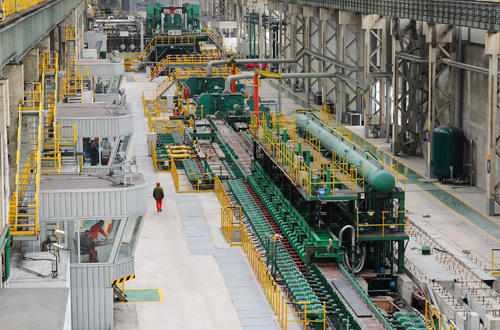|
 |
|
STEELY RESOLVE: Workers produce die steel in the Dalian Production Base of Dongbei Special Steel Group Co. Ltd. on November 14, 2011 (LIU DEBIN) |
Mei Xinyu, a researcher at the Chinese Academy of International Trade and Economic Cooperation, said under the present international economic situation, it is unrealistic for the external demand to resume the level before the European debt crisis.
There are also major uncertainties in emerging markets. For instance, India has been faced with trade deficits and depreciation of the rupee, which intensifies exchange risks for investors. Russia and Brazil face similar risks. China's other important trading partner Japan is playing a limited role in promoting China's external demand.
When exports are weakening, investment also encumbers the speed of economic growth. According to the National Bureau of Statistics, in the first four months, China's fixed asset investment grew by only 20.2 percent, the lowest since 2003. In the January-May period, the growth rate even fell below 20 percent, a threshold of "appropriate growth of investment."
At present, growth of China's real estate investment is dropping significantly because of strict control policies, sluggish real estate sales and restricted sources of development loans. Meanwhile, manufacturing investment is declining for the influence of the weak international economy and lowering real estate investment and corporate profitability. Therefore the market expects that investment growth will continue to decline. Since reaching the height of 25.8 percent in May 2011, growth of fixed asset investment has been declining.
Among the troika driving up economic growth, only consumption is stable. In May, retail sale of consumer goods grew 0.84 percent month on month.
Zhang Liqun, a researcher at the Department of Macroeconomic Research of the Development Research Center of the State Council, said attention should be paid to a significant slowdown of economic growth, because this will cause increasing unemployment, decreasing urban and rural resident incomes and declining taxation revenues, and business difficulty of enterprises will cause an increase of non-performing loans in commercial banks.
Guaranteeing measures
Continuous economic slowdown is the result of macro-control measures by the Chinese Government for more sustainable development, and the growth speed is still higher than the target of 7.5 percent fixed by the Chinese Government at the outset of this year. However, this continuous slowdown has still attracted the attention of the Central Government. In May, Premier Wen Jiabao stressed the importance of maintaining a steady economic growth.
The NDRC accelerated approval of industrial projects. On May 20, the commission approved more than 100 projects. Some big projects, such as the steel projects in Zhanjiang and Fangchenggang, which were previously rejected for strict control of excessive production capacity, were given new life.
The interest cut on June 8 is expected to provide more currency support to investment. Tang said the interest cut is a measure by the central bank to cope with the slowdown in economic growth and ensure steady growth. "Given present figures, GDP growth in the second quarter is likely to be lower than 8 percent. The recent government policies indicate that approval of new projects is being accelerated, but the reduction of the reserve requirement ratio shows that the economic situation is really not so good. Therefore the interest cut this time is of course favorable to the whole real economy. It is conducive to reducing financing costs of enterprises and stimulating their demand of funds," he said.
Du Ying, NDRC Vice Minister, said at a press conference on June 1 that at present, the task of "stabilizing growth" includes four parts: continuing to implement structural tax reduction measures, maintaining a reasonable credit scale, expanding consumption and keeping a reasonable investment scale, and stabilizing exports.
When exports turn sluggish and consumption grows steadily, the speed of economic growth is decided to a large extent by that of investment growth. Zhang said in the short term, a fast way would be to launch investment projects, but in the long run, the government should rely on expanding consumption.
According to Zhang, against the backdrop of the accelerated process of China's urbanization and industrialization, a certain investment scale is necessary. During this period, the Chinese economy cannot develop without investment. In the meantime, for the need of transforming growth pattern and economic restructuring, the government should accelerate its effort to nurture consumption.
Zhang stressed that monetary policy is important now, because it is closely related to the recovery of economic growth and the stability of demand. Control of money supply by the central bank seemed too tight last year for the purpose of coping with inflation, leading to the inadequate credit supply this year and curbing economic growth to some extent.
"At present market liquidity is tight, offering inadequate support to the economic growth. When prices are almost stable, the monetary policy should give more support to economic growth," said Wang Jun, Deputy Director of the Department of Consultancy of China Center for International Economic Exchanges. Wang predicted that the central bank may further relax monetary policy within the year.
Restructured growth
At the June 1 press conference, Du said China would not launch stimulus measures like the 4-trillion-yuan ($586 billion) package after the 2008 global financial turmoil.
| 